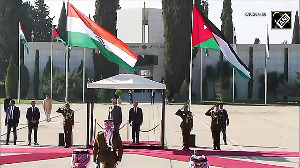North Korea's nuclear test has complicated the implementation of the Indo-US civil nuclear deal, with a bill on the agreement set to come up in the lame duck session of the Senate that gets underway in about four weeks.
Till now, officials had pointed to only two factors that could affect the passage of the bill in the Senate -- an insistence by Democratic lawmakers on a 'handful' of amendments to be debated, and implications of the change of political environment on Capitol Hill after elections on November 7.
But North Korea's nuclear test has complicated the civilian nuclear legislation as it clouds the overall atmosphere of the debate the Senate may have when it returns for the lame duck session on November 13, experts said. "The North Korean nuclear test is a worry to the civilian nuclear deal," said Professor Harold Gould, visiting scholar in the Center for South Asian Studies at the University of Virginia.
He said the emergence of the North Korean threat could possibly affect the smoothness with which the civilian nuclear deal passes through Congress. "North Korea has raised the anxiety level about nuclear non-proliferation and this could reverberate in the civilian nuclear deal," Gould told PTI.
"And with the Bush administration losing its legitimacy, it might not have any influence in Congress," he said. The US administration, however, has said North Korea's nuclear programme could not be compared with that of India even as it lauded New Delhi's non-proliferation credentials.
That North Korea's nuclear test has underscored India's impeccable non-proliferation record in spite of it being a non-signatory to NPT is an issue that supporters of the civil nuclear deal will try to push, the experts said.
Several lawmakers, aside from looking at the nuclear deal as a basis for strengthening bilateral relations, have stressed the priority that India has assigned to non- proliferation principles. The Republican and Democratic leaderships have said their top priority is to get the civil nuclear legislation through during the lame duck session.
But lawmakers in the Senate with tough anti- proliferation credentials will again try and revive the debate on the dangers of nuclear non-proliferation with North Korea as the starting point. And it is unlikely that the Bush administration's argument -- that North Korea, Pakistan and India are different cases -- will carry much weight on Capitol Hill.
The larger problem, experts point out, is the implication for the civil nuclear deal in the event of a change of the political environment on Capitol Hill after the November 7 election. Several surveys in the past few days have consistently showed the Republican Party rapidly losing support and political analysts are now convinced the party stands to lose the House of Representatives and the Democrats have a fair shot at the Senate.
Experts pointed out that the lame duck session on November 13 is not a guarantee for the passage of the civil nuclear deal in spite of what the Republican and Democratic leaderships have said.





